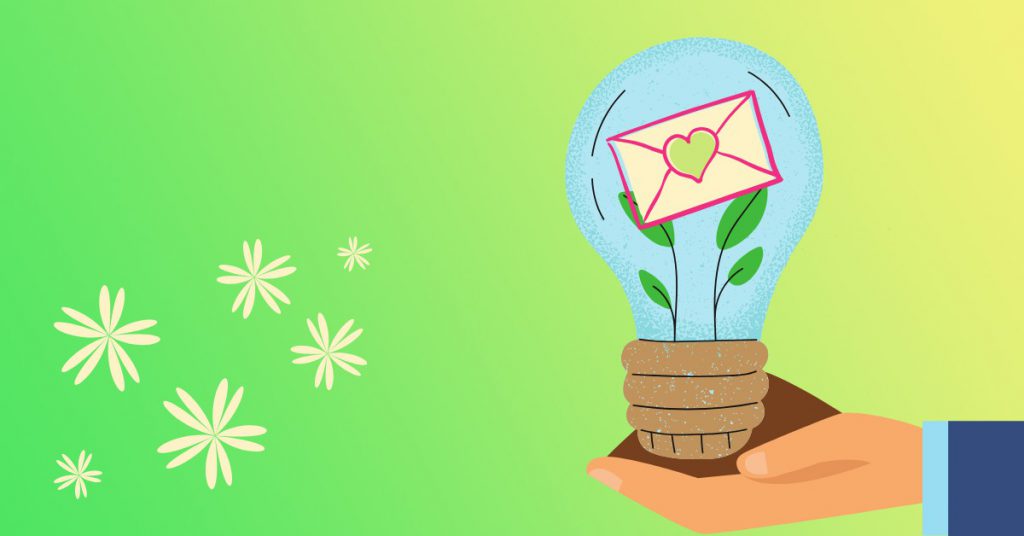Whether you’re just getting started with growing your email list or you’re rarin’ to grow from 10K to 100K engaged subscribers, this is the marketer’s guide to how to grow your email list fast.
A healthy, engaged, growing list is one of a business’s greatest marketing assets. That’s why we always remember to clean your email list with any of the best email checker before sending any emails. Email subscribers are people who have opted-in to receive updates from a business directly to their inbox.
What a business does within the hallowed pixels of the email inbox is up to them. Convert leads into loyal customers, and even brand evangelists!
Of course, before a business can get that far, they have to grow that email subscriber database.
Which leads us to…
50 Ways to Grow an Email List Fast
Implement even a handful of these contact list tactics and you’ll be multiplying your contact database in no time.
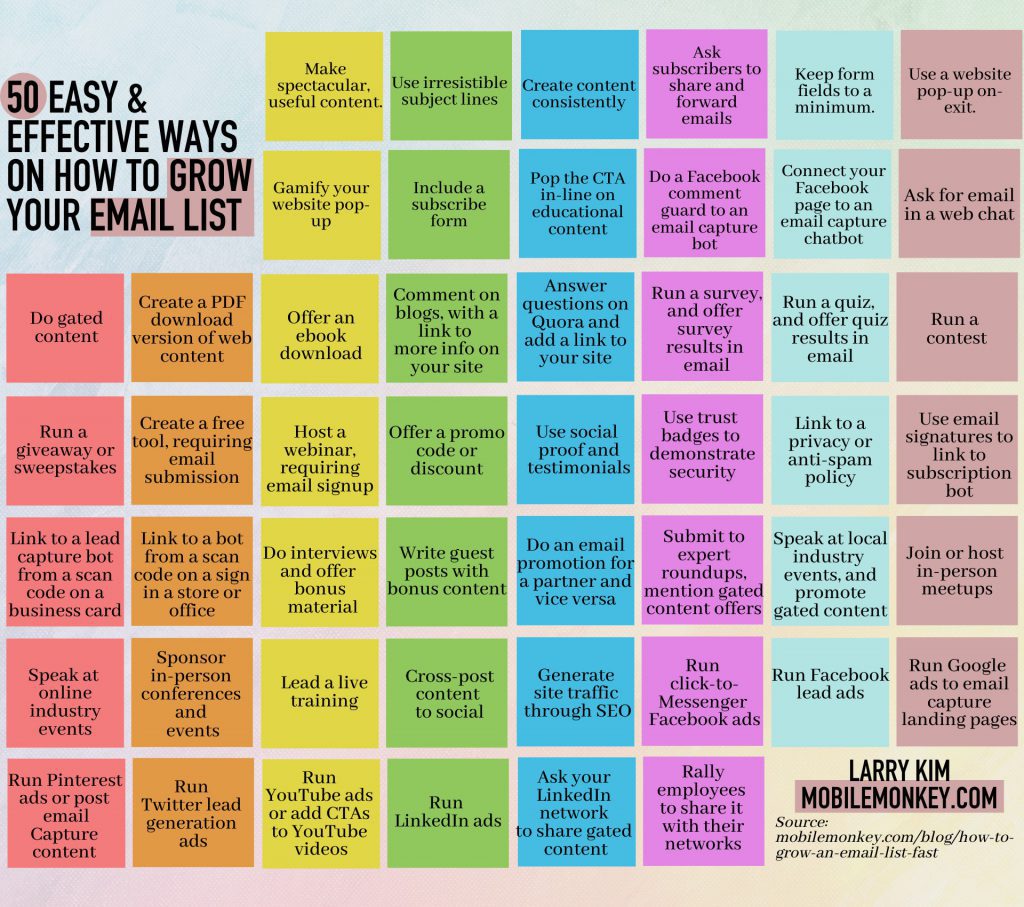
- Make spectacular, useful content.
- Make your emails irresistible from subject line to body content and design.
- Create content consistently to make email subscription essential.
- Ask subscribers to share and forward emails.
- Keep form fields to a minimum.
- Use a website pop-up on-exit.
- Gamify your website pop-up (e.g., different offers on a wheel spin).
- Include a subscribe form in a webpage sidebar.
- Pop the CTA in-line on educational content.
- Do a Facebook comment guard to an email capture bot.
- Connect your Facebook page to an email capture chatbot.
- Ask for email in a web chat.
- Do gated content (all or bonus content).
- Create a PDF download version of web content.
- Offer an ebook download.
- Comment on blogs, with a link to more info on your site.
- Answer questions on Quora, with a link to more info on your site.
- Run a survey, and offer survey results in email.
- Run a quiz, and offer quiz results in email.
- Run a contest.
- Run a giveaway or sweepstakes.
- Create a free tool, requiring email submission.
- Host a webinar, requiring email signup.
- Offer a promo code or discount.
- Use social proof and testimonials.
- Use trust badges to demonstrate security or top quality.
- Link to a privacy or anti-spam policy.
- Use employee email signatures to link to subscription bot, form or special offers.
- Link to a lead capture bot from a scan code on a business card.
- Link to a bot from a scan code on a sign in a store or office.
- Do interviews and offer bonus material.
- Write guest posts with bonus content or work with a guest posting service.
- Do an email promotion for a partner and vice versa (aka list swap).
- Submit to expert roundups, mention gated content offers.
- Speak at local industry events, and promote gated content.
- Join or host in-person meetups.
- Speak at online industry events.
- Sponsor in-person conferences and events.
- Lead a live training.
- Cross-post content to social.
- Generate site traffic through SEO.
- Run click-to-Messenger Facebook ads
- Run Facebook lead ads.
- Run Google ads to email capture landing pages.
- Run Pinterest ads or post email capture content in Pinterest teasers.
- Run Twitter lead generation ads.
- Run YouTube ads or add CTAs to YouTube videos.
- Run LinkedIn ads.
- Ask your LinkedIn network to share gated content.
- Rally employees to like content and share it with their networks.
Did any of those tactics for growing an email list look totally new to you?
There were probably some you’ve never thought of before. Especially those involving the use of chatbots for email capture.
How to Use Chatbots as a Secret Weapon for Email List Growth
Below we’re going to explain the super powerful tactic of using chatbots to capture emails and then automatically send those emails into your email software.
We’ll cover:
- Why using chatbots and email amplifies your marketing and customer communication
- How chatbots and email marketing work together for expanded reach
- How to start growing your email subscriber list in 10 simple steps using chatbots.
Traditionally, marketers have viewed traffic-driving sources as channels.
While it’s often still the case, this kind of thinking doesn’t promote omnichannel marketing. It doesn’t encourage individual marketing channel owners to work together effectively.
That’s GOT to change.
For instance, chatbots can be so much more when worked in conjunction with email. And email can be so much more when worked in conjunction with chatbots. It’s not one versus the other. 1+1 really does make 3 in this instance!
In this article, let’s explore how chatbots and email can work more effectively together; alongside how to grow your email list a lot faster, leveraging the power of chatbots.
Note: In this instance we’re not just talking about our email notifications or our email capture chatbot, although you should check out those resources too.
Communication via email vs. communication via chat
One of the reasons why chat and email aren’t competitors is the distinctly different communications style of each medium.
As Mary Lister shared on the Wordstream blog, it’s important that you stick with consistent branding for your email campaigns.
Email is a super-personal way to speak to your audience; make sure you’re leveraging your brand voice consistently. It can be endlessly confusing if you’re sending serious email updates and fun promotions from the same branded template, so try to designate colors, typefaces, and email signatories to each.
Mary Lister | Wordstream
Chat isn’t like that. It’s more informal. You can stretch what’s acceptable and expect real-time interaction.
Chatbots complement your email strategy
Whether you’re a chat marketing pro or just getting started, your chatbots should complement your email strategy.
Chat marketing is not meant to replace your email marketing, especially if you’re just getting started with chat.
A great way to “get your feet wet” building chatbots is to use them for lead generation for your existing email campaigns.
After a few weeks or months of using Customers.ai and getting used to chatbots and seeing how they all work, you can use chat to create great end-to-end strategies.
But if you’re just getting started with chat and you already have an email drip campaign up-and-running, why not just use your chatbot to funnel leads into that?
After you’ve done that, you can also set up a chatbot drip campaign.
When prospects or customers are chatting with a brand’s chatbot, they’re engaging with the brand. This is a great time to invite someone to create a connection with the brand in email as well.
Chatbots, it just happens, are a great tool for email capture because they’re interactive, convenient and instant, and can be connected directly to an email marketing platform to automatically send contact data, including email address.
How to grow your email subscriber list using chatbots
Chatbots are a novel way to grow your email subscriber list. However, it’s your responsibility to avoid any bad email address.
Web forms, the way you probably grow your list at the moment [as opposed to chat forms] aren’t working as well as they used to. They have really bad conversion rates. Most of your audience don’t want to deal with email sign-up forms.
However, chat still has this sort of sense of newness and your audience are more likely to engage in chat versus filling out an email opt-in form. If you ask somebody for their email address or their phone number on chat, they’re more likely to provide it to you.
In order for you to set up a system that works, you’ll need to transport subscriber email addresses from Customers.ai to your email software. That’s where Zapier comes in.
Use Zapier to link Customers.ai with your email software
Zapier is a great tool. Essentially it sits as a middleman in-between loads of MarTech software tools and lets you integrate any of them together.
When you integrate Customers.ai with Zapier, you immediately have access to over 2000 other applications, such as Google Sheets, MailChimp, and other email platforms.
Next up, we’re going to show you a quick little demo of how you can set up one of those workflows to build an email list using chatbots.
Pro-tip for chat vs. email communications: Adjust your brand voice
You possibly have an existing brand voice. Even so, you should be tailoring that for chat communication.
Chat is shorter and it’s more interactive. Chat is more engaging. It catches your subscriber wherever they are. Email is more likely to be ready in front of a computer or at set times during the day.
Users are more likely to swipe email notifications away on my phone. With chat, they’re a little bit less inclined to do that because they can read so quickly.
It’s important that you consider chat to be a different type of communication versus email.
Where you might use a more corporate, formal voice in your email, chat is a little different.
Chat is a less formal than email. And chat is more interactive than email.
In chat marketing, feel free to ask questions, and include lots of visually interesting elements like images, GIFs and emojis in chat.
Pro Tip for Email Capture Chatbots: Use email and chatbots in tandem
If you’re actively using a chatbot on Facebook, you’ll be aware that Facebook only lets you send promotional messages within 24 hours of the last time somebody interacted with you.
A great way to get your prospect back into that 24-hour fold is to include a link to your chatbot in the emails you send out.
This way, once they click on the link, they’ve engaged with your chatbot. This means that you’re open for you to reach out to them again.
Next-level pro tip for email capture chatbots: Use custom fields
Also, a next-level pro tip would be for you to determine if someone has signed up using your chatbot in addition to being an email subscriber and if so, provide them with that chat link in your email.
However, for people who aren’t chat subscribers, you just provide them with a link to the same information on your website (where they can be driven towards your website chat widget).
Including a chat link for certain email subscribers is possible if your email system lets you create custom fields. Most of them do. Just tag email subscribers who happen to be chat subscribers too. Most of them do. Just tag email subscribers who happen to be chat subscribers too. Additionally, enhance your email communication strategy by incorporating a free email verifier to ensure the accuracy and validity of subscriber email addresses.
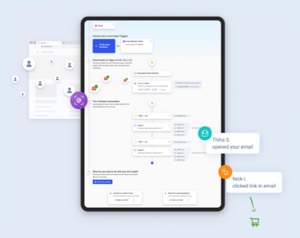
See Who Is On Your Site Right Now!
Turn anonymous visitors into genuine contacts.
Try it Free, No Credit Card Required
How to grow your email subscriber list using chatbots in 10 steps
These 10 steps to using a chatbot to grow an email list are broken down to their essential parts and only take a few minutes to set up.
Step 1: Create a “start bot”
We’ve navigated to the “Facebook page welcomer” section in Customers.ai on the screenshot below.
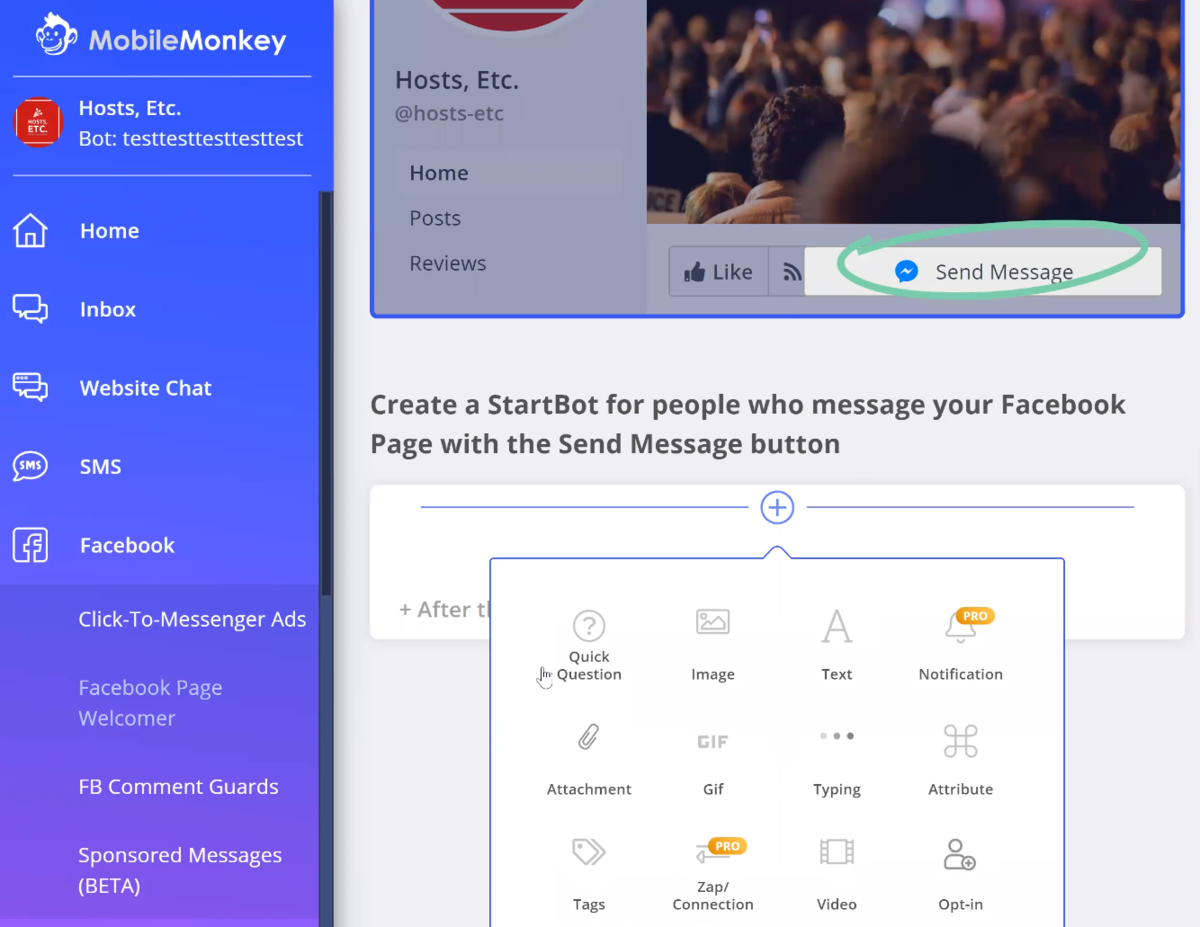
Here are the messages that will be sent to users who go to your Facebook page and click on the “send message” button.
At the bottom of the screenshot we can create what we call a “start bot”, which is just a quick conversation using our trusty widgets.
[In this “start bot”, our main goal is going to be to ask users for their email address. Then we’re going to take that email address and send it over to our email provider, MailChimp using Zapier.]
Step 2: Initiate the conversation
Rather than asking for someone’s email address straight away, it’s important to initiate a conversation in a way that interests people and helps to demonstrate to us that they’re our target audience.
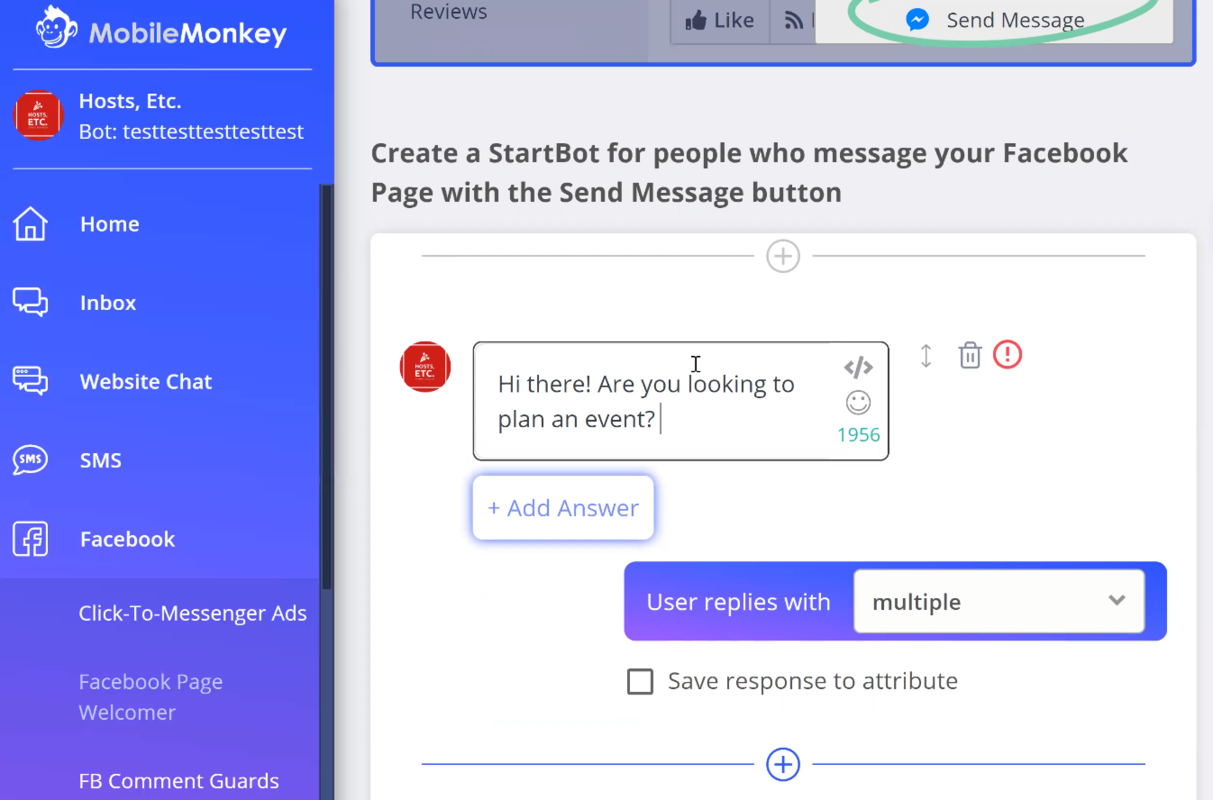
If they respond to our initial query, they’re going to become a Customers.ai contact (even if they don’t provide their email address as part of the conversation.) , so it’s important to make it engaging.
For this example, the first question we’ll ask is, “Hi there. Are you looking to plan an event?”
(Note: This particular example uses a test Facebook page called “Hosts, Etc.” which is a fictitious event planning service.).
Step 3: Set up your user’s answer options as quick replies
We’ll then set multiple choice answer options for our question. In this case, just “Yes” or “No”, but you can get more creative than that – and creativity fosters engagement!
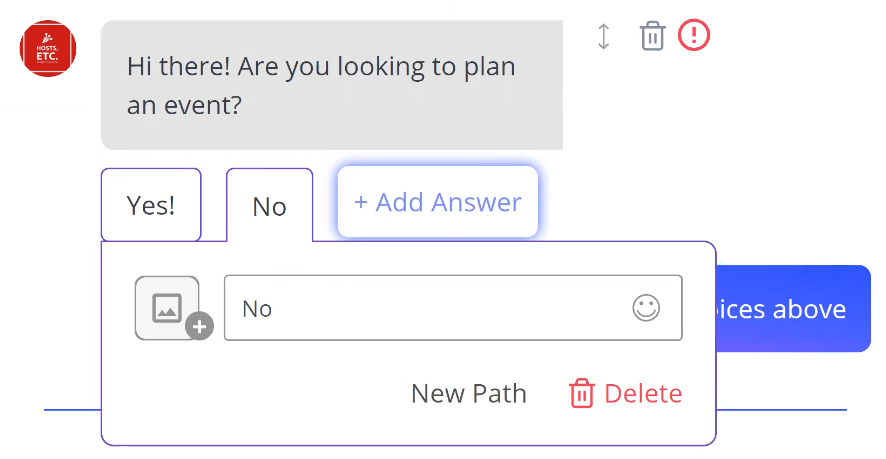
The two answers that we set up may have different paths that we want to send the contacts down. We’ll create a new path for the “yes” answer for our example.
Step 4: Ask for their email address
This is where we’ll ask for their email. Whenever you’re asking for an email address, what you want to do is, in the “user replies with” field, choose “email”.
This is going to ensure that we’re validating that the user types in a real email address. You should also automatically save the answer as an email attribute in Customers.ai.
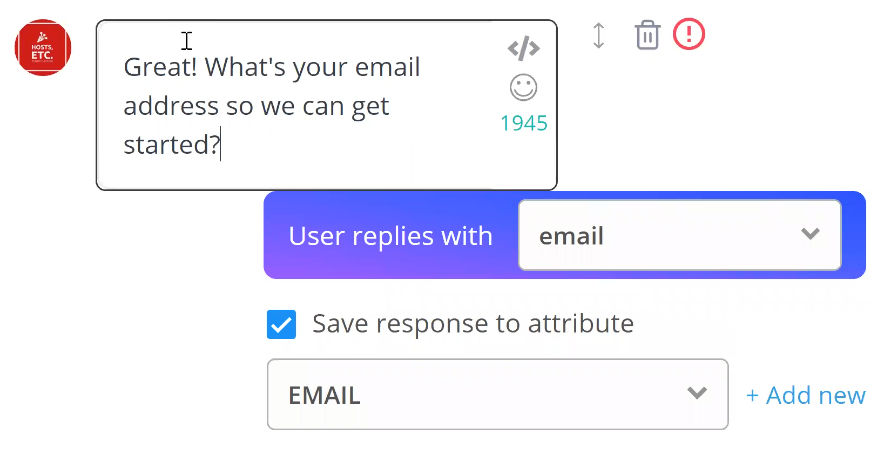
To obtain the email address, we’ll comment: “Great. What’s your email address so we can get started?”
As it’s part of a conversation and we don’t lead with the email request, it’s much more likely that the user will respond favourably.
If the user types in “No” this doesn’t necessarily mean that it’s the end of the conversation. We can still say something like: “Understood. Mind if we ask for your email so we can stay in touch?”
If they then provide their email, make sure you thank them, say when and why you might be in touch and leave a pleasant parting response.
Step 5: Connect your Customers.ai account with your email provider using a Zapier connection
The next thing we have to do is send this data over to MailChimp in our example (or you can send it to a selection of other email providers), via Zapier.
To set that up, we actually want to switch over to the Zapier section of Customers.ai as per the screenshot below.
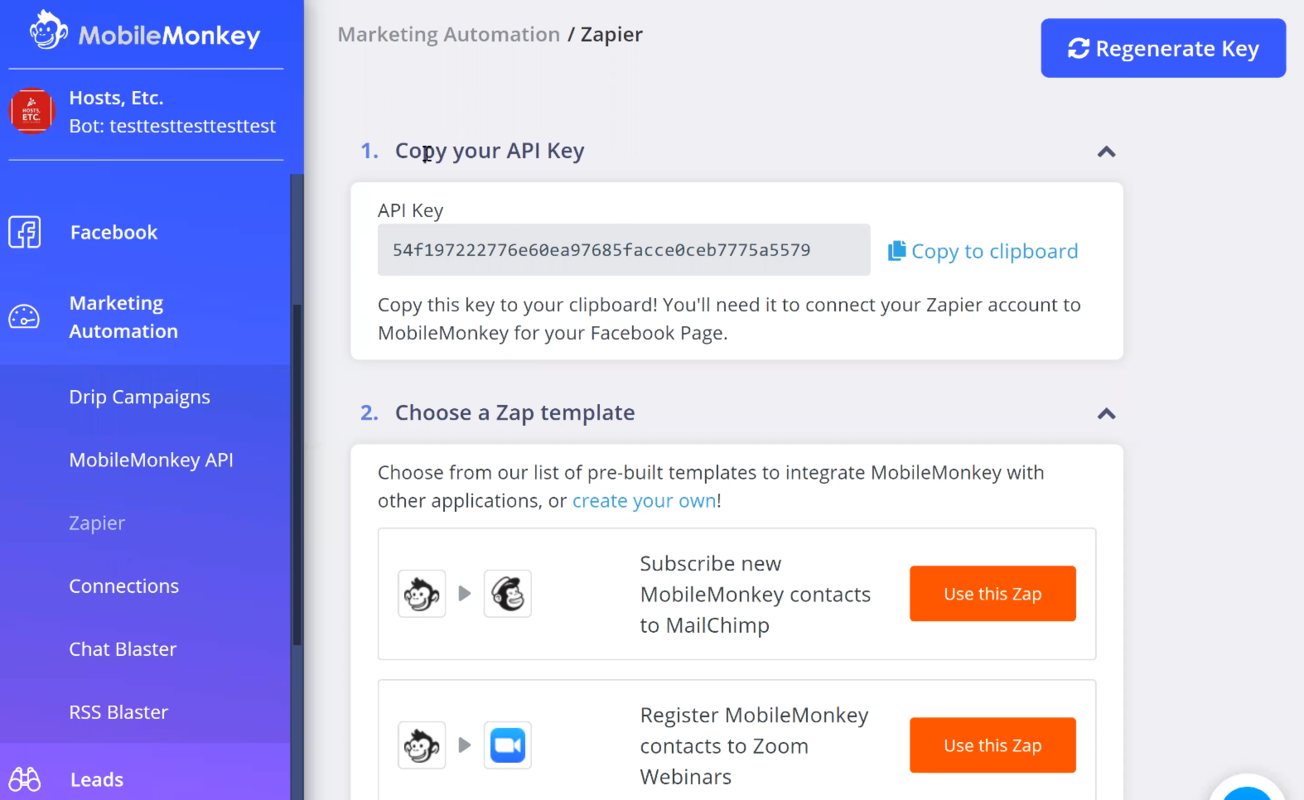
Here, in the Zapier section, you’re going to see a couple of things. At the top, you’re going to see your API key. (The API key is just something you’re going to plug into Zapier so it knows which Customers.ai user you are.).
You need to copy your Customers.ai API key and enter this in Zapier.
Step 6: Select a connection type
We’ve actually created a selection of Customers.ai Zapier templates, allowing you to quickly and easily set up the connection that’s right for you. You can either select one of these chatbot templates or build the connection that’s right for you inside Zapier.
Inside Zapier the big shiny “Make a Zap” button is what you’re looking for if you’re setting the connection up yourself.
Let’s do this for our example.
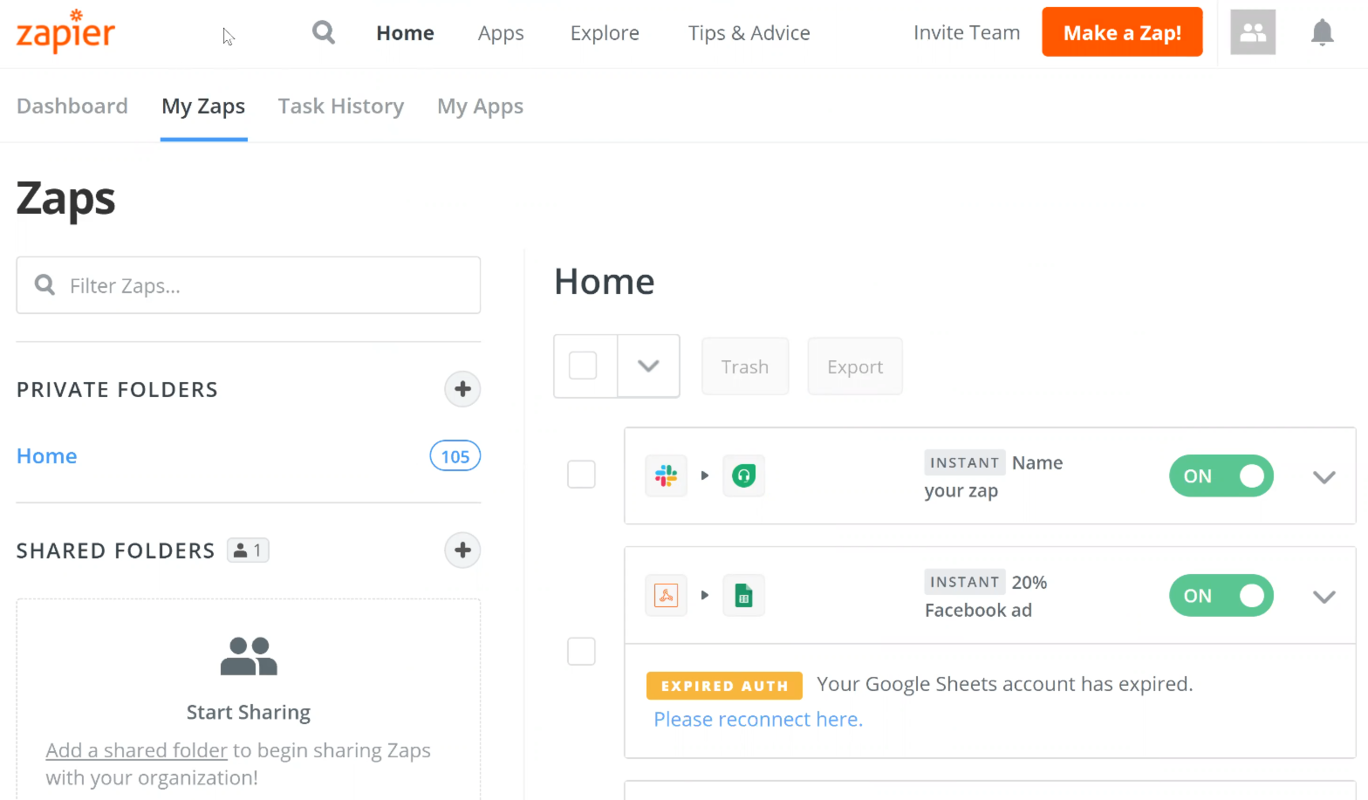
If you’ve never used Zapier before, the basic format is every single “Zap” starts with a trigger, and the trigger is going to be the thing that happens that causes the Zap to fire.
When it fires, it’s going to generally do an action for you. (There’s a lot that you can do with Zapier, but for our example, we’re focusing on actions.)
Step 7: Select a trigger in the chatbot dialogue
Now we choose a trigger that fires the connection. In this case, our trigger is going to be when somebody provides us their email address in Customers.ai.
The action is going to be sending that contact over to a MailChimp list.
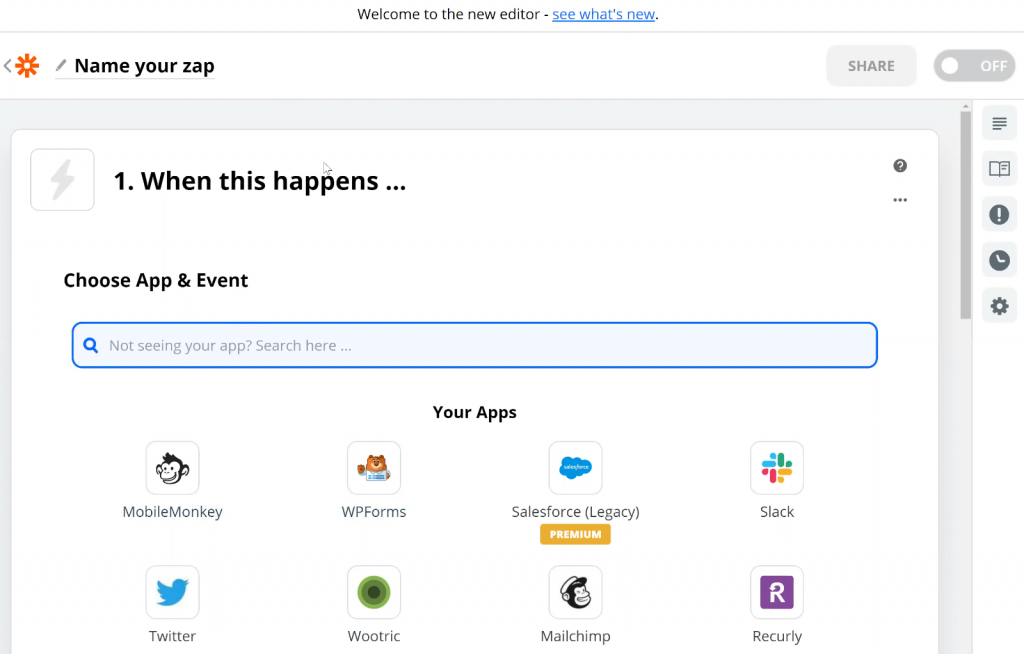
Under the “When this happens …” headline inside Zapier we select out trigger. In this case it’s the action of an email address being provided to Customers.ai.
At this point in Zapier we can select one of three different options:
- New Contact
- New or Updated Contact Attribute.
- Connection Widget Reached
A ‘New Contact’ is self-explanatory. A ‘ New or Updated Contact Attribute’ keeps a contact in sync, ensuring that your contacts’ attributes are kept up-to-date in your other martech platforms. Finally, ‘Connection Widget Reached’ is triggered every time you put a little widget in your start bot or in your dialogue. We’ll use this one as it happens to be the most popular.
Back in our Customers.ai account we’re going to select “Edit Accounts”. Now we’re going to choose our Facebook page that we want to build the Zap on.
Next you’ll see a pop-up window from Zapier. This is where you need to paste your Customers.ai API key that we copied from Customers.ai.
After that we select “Customised Connection Widget Trigger”.
We’re going to call the trigger name “Emails to MailChimp”. The name is important because it’s also going to be what you select in your connection widget inside Customers.ai.
It would be a good idea to give the same name to your Zap.
Step 8: Test your connection
Under the “Find Data” section Zapier will run a test where it’ll pull in contacts from our Facebook page via Customers.ai.
Let’s select “Test & Continue”.
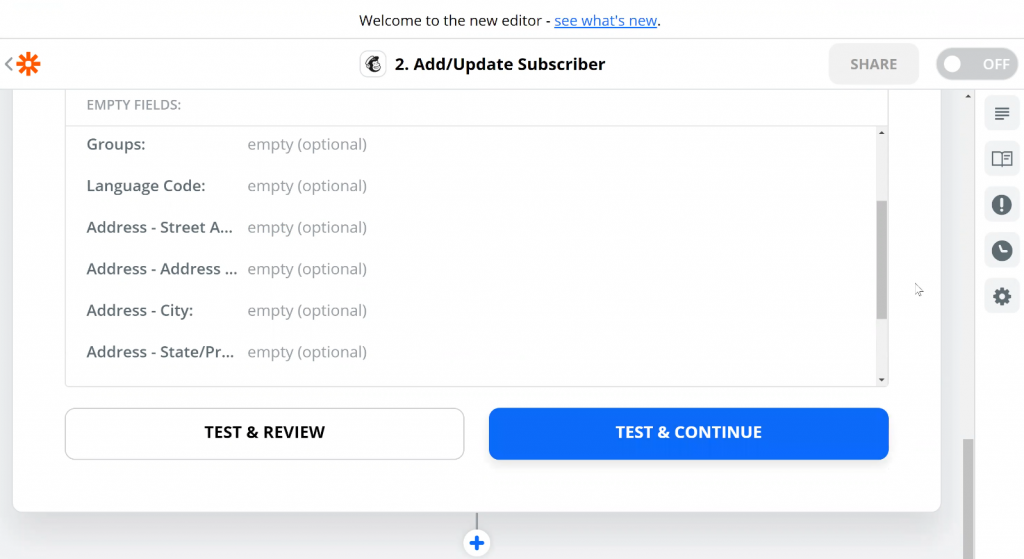
We can see from this screenshot that the test worked and that the Zap successfully pulled email addresses from 2 of our contacts.
Step 9: Select an action to complete the zap connection
We now have our trigger all set up. Every time a connection widget is reached in Customers.ai, we’re going to do be able to sync our contact’s data with our email list.
Next we need to focus on “actions”.
For our action we need to select the most appropriate action for Customers.ai inside of Zapier. We’re going to select “Add or update a subscriber”.
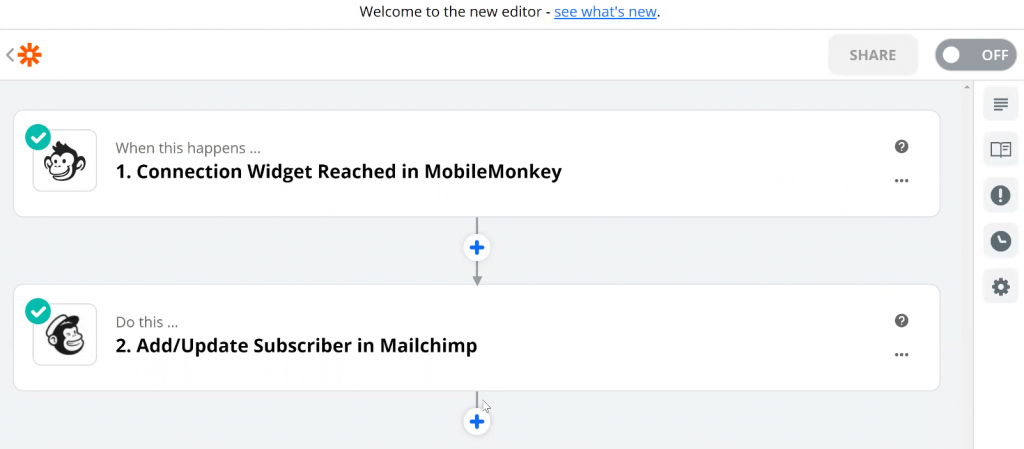
Next, you’re going to match your fields. This is where you ensure that your contact’s email address gets saved in the correct place in your email provider.
Step 10: Run the final test
After that when you have your action selected and your fields matched up, you need to do a final test to ensure that everything is working as intended.
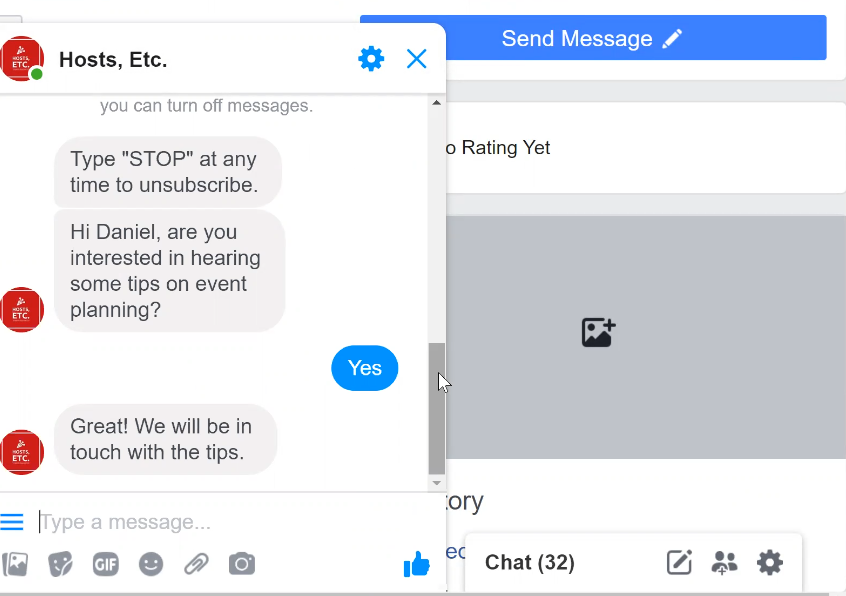
As well as testing this in Customers.ai, Zapier and your email software provider, you should also test your sequence fully with your Facebook Messenger, just to ensure that the end user receives the experience that you intend to provide.
Once you start to make full use of obtaining email opt-ins directly from chat, you’ll be doubling your list growth in no time!!
7 ways to grow your email list in 2020 using chat marketing automation
Once you’ve got everything up-and-running, you’re bound do want to keep on growing your email list using chatbots.
Here are 7 different ways that you can continue to grow your email list in the year 2020 and beyond using chat…
1) Grow your email list using webchat
You may currently use or are planning to use webchat on your website to answer web visitors’ questions or get them answers fast.
If so, start incorporating “Can we just have your email address in case we get disconnected?” into your conversation to ensure that the communication loop isn’t unexpectedly closed.
2) Incorporate asking for an email at the end of mini-surveys
A wonderful way to engage your audience on chat is to ask them to complete mini-surveys, keeping you top-of-mind and also re-engaging your contacts.
However, at the same time, also use this as an opportunity to obtain more email opt-ins.
3) Register for online and in-person events with a chatbot
If you’re hosting a webinar or an online summit, it’s a great idea to sign people up for events with a chatbot, and send attendees calendar invites or event reminders through the bot as well.
Why not do everything inside of chat, including the sending of calendar links after you ask for the email address?
4) Offer discount coupons to grow your email list
Next, try growing your email list while you give away discount coupons? (i.e. if a chat user demonstrates that they’re interested in receiving a discount coupon, ask them for their email address so that you can send it there.
5) Use a Facebook Comment Guard (Facebook post autoresponder) to capture emails
There are a number of tactics when it comes to how to get email addresses from Facebook.
Using a Facebook Comment Guard is another wonderful way of building an email list using chat. Essentially, this lets you grow your Messenger contacts and grow your email list just by continuing to do what you’re currently doing (sharing great content on social media).
6) Capture emails from click-to-Messenger ad audiences
Click-to-Messenger ads can supercharge your email list growth. Not only will click-to-Messenger ads radically reduce your lead capture cost, but you can also use this paid traffic source as a predictable way to grow your email list.
7) Link to an email capture chatbot from a QR scan code on a business card or sign
We all know that people won’t remember and type in URLs. A great way of sharing a link to your email capture Messenger bot from a physical location is using a QR code generator and then including the QR code on a business card or sign.
Final Thoughts on How to Incorporate Chatbots to Grow Your Email List Fast(er)
There is almost an infinite amount of ways that you can use chat to obtain email addresses and grow your email list fast. The limit is your imagination!
The key is to get started by connecting your chatbot with your email provider.
As soon as you do that, start with these suggestions and then brainstorm further ways of encouraging your chat users to share their email addresses.
Remember, chatbots and email aren’t competitors. They’re 2 very different ways of communicating that complement one another when done well.
We hope that you enjoyed this episode of the Chat Marketing Train! How are you currently growing your email list using chat?
Join Today’s Webinar with Larry Kim!
Or Register for the Free Replay
Learn all about NEW 100% Meta-Approved Automation Tools from Customers.ai with a spotlight on features to 10X Instagram & Facebook Engagement and turn social media into a revenue driver for your business.

Important Next Steps
- Sign up for Customers.ai’s OmniChat™ free chatbot builder to begin to grow your email list using the power of chat marketing.
- Subscribe to Customers.ai’s Bot Training for Marketers YouTube channel to get notified when new chat marketing tutorials and stories are added each week.
- Want to talk to other chatbot enthusiasts about chatbot marketing? Join Customers.ai Island on Facebook!
